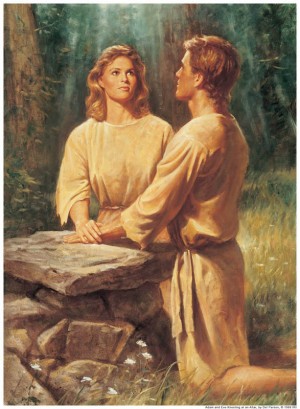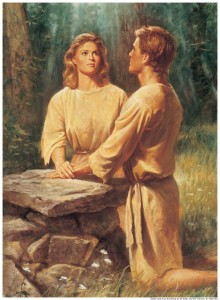Mormons see Adam and Eve very differently than most of the Christian world. Rather than blaming Eve for all our problems, we celebrate her as the mother of all living and honor her for making the hardest choices. Through the scriptures of the restoration and modern revelation, we have learned more about these two first ancestors.
Adam and Eve were created by Heavenly Father and placed into a peaceful place to begin their lives. We can think of this as replacing the protected childhood of most people. Here they had everything they could want and only one request to obey. This allowed them time to settle into their marriage and the unfamiliar world in which they were placed, and they could have chosen to stay there forever, had they wanted to do so. However, their progress would be very limited if they did so. They would not have children or progress through a normal lifespan. This would also mean they could not fulfill the purposes for which they were sent.The story of Adam and Eve really begins long before their birth. Prior to the creation of the world, God createdspirits. These spirits had the form of the people who live on earth today, but did not have bodies. They did, however, have personality, talents, and the right to make choices. Each developed in his own way, becoming something of the person he would be on earth.
When life is too comfortable, progress is limited. God, wanting us to progress further, told us He would create for us a world. We would be able, when we came there, to have a body and a family. We would have a figurative veil drawn over us so we would be unable to remember our time in God’s presence. However, the Spirit of Christ and the Holy Ghost would testify to us quietly when we learned truth, if we were sincerely seeking truth. In this way, we’d be able to find our way back.
In order for this life to have meaning, we had to face trials, tribulation, hard work, and choices. In the Garden of Eden, none of that was possible. Adam and Eve understood they faced two conflicting set of instructions-to avoid the fruit of the tree and to go forth and multiply. Today, we often face conflicting instructions from God. For instance, a child is commanded to honor and obey his parents, but then might face a situation in which a parent instructs him to break another commandment. The child must then choose which commandment to obey. One of the challenges of mortal life is to use our agency and our wisdom to decide which commandment is the better part for that particular situation.
Adam and Eve would not raise a family in the shelter of the garden. Had they selfishly chosen to remain, we could not have come to earth. Eve chose the better part when she chose motherhood and made a decision to leave the garden, even though it meant hardship, suffering, and death, not just for her, but for all of us. It was the only way life on earth could have meaning and purpose.
Lehi, the first prophet of the Book of Mormon, explained it this way:
If Adam had not transgressed he would not have fallen, but he would have remained in the garden of Eden. And all things which were created must have remained in the same state in which they were after they were created; and they must have remained forever, and had no end.
And they would have had no children; wherefore they would have remained in a state of innocence, having no joy, for they knew no misery; doing no good, for they knew no sin.
But behold, all things have been done in the wisdom of him who knoweth all things.
And the Messiah cometh in the fulness of time, that he may redeem the children of men from the fall.” (2 Nephi 2:22-26)
These verses help us to understand that the ranges of emotion are essential to our learning in this mortal life. We can’t recognize or appreciate joy until we’ve experienced heartache. We couldn’t appreciate the pleasure of making good choices until we knew how sin affected our spirits. To experience all of this, we had to be in the world, not in the garden.
Mormons do not believe in original sin. The church has a statement of thirteen articles of faith, written by Joseph Smith. The second says, “We believe that men will be punished for their own sins, and not for Adam’s transgression.” While there are certainly consequences for our own lives in their choice, including that of death, the atonement protects us from being directly held responsible for another person’s choice.
Jesus Christ, in that same pre-mortal life, offered to serve as our redeemer. He alone would live a sinless life and then would atone for our sins in the Garden of Gethsemane, and following that, die for us on the cross. This made it possible for us to repent and be forgiven for our sins, and to live again after death. Because He atoned for our sins, we are not accountable for the choices made by Adam and Eve. We are accountable for only our own sins, and can repent only for those sins we ourselves committed.
We don’t have a very complete record of Adam and Eve’s time on earth, and so we don’t know a great deal about the thought process that went on. We do know that God’s plan for us was carried out.
Dallin H. Oaks, an apostle, helps us to understand the nature of the choice made by Adam and Eve, and explains how Mormons view them:
It was Eve who first transgressed the limits of Eden in order to initiate the conditions of mortality. Her act, whatever its nature, was formally a transgression but eternally a glorious necessity to open the doorway toward eternal life. Adam showed his wisdom by doing the same. And thus Eve and “Adam fell that men might be” (2 Ne. 2:25).
Some Christians condemn Eve for her act, concluding that she and her daughters are somehow flawed by it. Not the Latter-day Saints! Informed by revelation, we celebrate Eve’s act and honor her wisdom and courage in the great episode called the Fall (see Bruce R. McConkie, “Eve and the Fall,” Woman, Salt Lake City: Deseret Book Co., 1979, pp. 67-68). Joseph Smith taught that it was not a “sin,” because God had decreed it (see The Words of Joseph Smith, ed. Andrew F. Ehat and Lyndon W. Cook, Provo, Utah: Religious Studies Center, Brigham Young University, 1980, p. 63). Brigham Young declared, “We should never blame Mother Eve, not the least” (in Journal of Discourses, 13:145). Elder Joseph Fielding Smith said: “I never speak of the part Eve took in this fall as a sin, nor do I accuse Adam of a sin. … This was a transgression of the law, but not a sin … for it was something that Adam and Eve had to do!” (Joseph Fielding Smith, Doctrines of Salvation, comp. Bruce R. McConkie, 3 vols., Salt Lake City: Bookcraft, 1954-56, 1:114-15).
This suggested contrast between a sin and a transgression reminds us of the careful wording in the second article of faith: “We believe that men will be punished for their own sins, and not for Adam’s transgression” (emphasis added). It also echoes a familiar distinction in the law. Some acts, like murder, are crimes because they are inherently wrong. Other acts, like operating without a license, are crimes only because they are legally prohibited. Under these distinctions, the act that produced the Fall was not a sin-inherently wrong-but a transgression-wrong because it was formally prohibited. These words are not always used to denote something different, but this distinction seems meaningful in the circumstances of the Fall.” (Dallin H. Oaks, “‘The Great Plan of Happiness‘,” Ensign, Nov 1993, 72)


